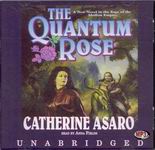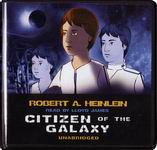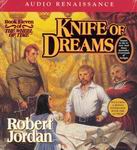
 The Quantum Rose
The Quantum Rose
By Catherine Asaro, read by Anna Fields
1 CD (MP3) – 13 ½ hours [UNABRIDGED]
Publisher: Blackstone Audiobooks
Published: 2004
ISBN: 0786186232
Themes: / Science fiction / Fantasy / Romance / Space opera / Telepathy /
I’ve always been a big fan of math. I like the chumminess of commuting, associating, and distributing; the edginess of integrating by parts; and the sharp antiseptic sting of differentiating exponentials. In The Quantum Rose, Catherine Asaro brings the robust methodology of a table of cosines to romantic space opera. Like a seasoned mathematics professor, she begins by defining the variables: A fantastically beautiful heroine; her strong, handsome but brutish betrothed; and a mysterious stranger who takes a sudden interest in the heroine. She then lays out the equations for us: fear, mutual need, and strange loyalty between her and the betrothed; fear, mistrust, sexual attraction, and a hidden wound that must be healed between her and the stranger. From there, she manipulates the terms using standard algebraic operations such as nudity, well-meaning ignorance, revenge, treachery, self-sacrifice for the greater good, declarations of undying love, and first time sex so amazing it humbles those of us with decades of experience.
Asaro’s story-solving skills are honed to such an atom-splitting edge that only halfway through the book, she derives the main quantity of interest: True love. Not satisfied with so straightforward a proof, however, she dashes diligently on to lead us through a desperate, if leisurely (and admirably bloodless), rescue of an exiled royal family halfway across the galaxy. It’s all quite rigorous.
Never does Asaro skip a step. In fact, for the elucidation of the reader, she will often review a step several times to ensure we’ve understood each point before moving on to the next. She also provides enlightening chapter headings, which contain both a plain English title and a subtitle composed from quasi-quantum mechanical terms (for those hopelessly muddled by such clever cryptology, I’ll provide a clue: Substitute the word “person” for “particle” in these subtitles, and you’ll crack the code for over half of them). Thus, we are duly apprised of all developments well before they occur in the text. As a final touch, Asaro has defined most of the significant variables to be empaths or telepaths, which means we are never in doubt of what anyone in the story is thinking or feeling unless some misunderstanding is required by the plot.
Anna Fields adds to the proceedings by reading the text out loud for us. As an intriguing counterpoint to Asaro’s linear clarity, Fields adds a note of mystery by using female character voices that are quite similar to one another and by occasionally using the voice of one lead male to deliver the dialog spoken by another. The drunken mutter she maintains for the most prominent male throughout the entire length of the book also tends to soften the hard edges of understanding that sometimes seem too prominent for comfort.
The most exciting aspect of this audio book, however, is the medium it is recorded on. That MP3 technology allows nearly 14 hours of spoken text to be recorded on a single, handy CD is like a divine response to listeners’ prayers. There is only one nicely packaged jewel box to open–no snarling tapes nor floppy CD sleeves that produce obligingly but accept only grudgingly, the sound quality is excellent, and the production is clean. Maybe someday I will have the opportunity to actually enjoy an audio book in this format.
Posted by Kurt Dietz



